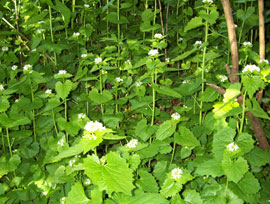Garlic mustard is a very invasive, fast-spreading weed, and Multnomah County has the worst infestation of it in Oregon. The roots produce a chemical that is toxic to other plants, and it can grow in most soil types. It can also grow in full sun or full shade, making it a threat to a wide variety of our native plants and habitats. You can help get rid of it, though – read on for some important tips about pulling up and getting rid of garlic mustard.
Many other plants are often mistaken for garlic mustard, especially before the flowers come up. Control is easiest when garlic mustard plants are in bloom (usually beginning in April), unless you can easily identify the rosettes (leaves) of the plant. Hand removal can be a successful technique in small patches that can be visited often and re-pulled frequently. Learn how to pull up garlic mustard and see more photos after the break! Continue reading


